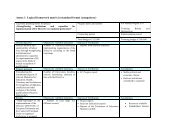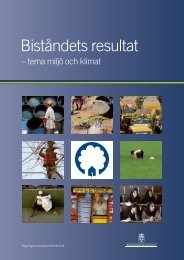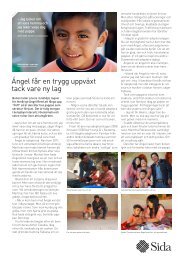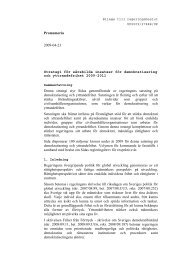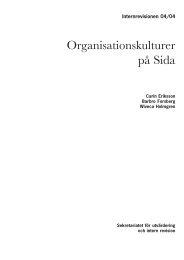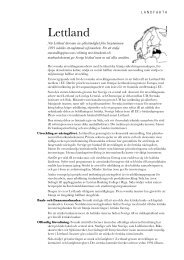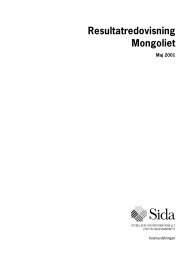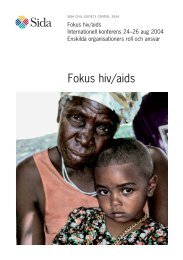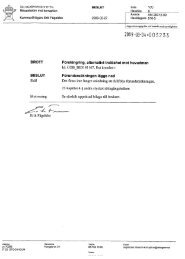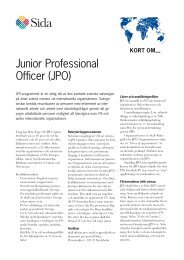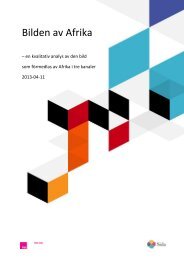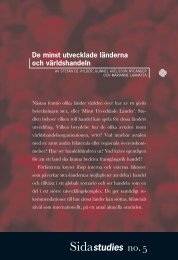Mid-Term Review of the AGIR Programme - Sida
Mid-Term Review of the AGIR Programme - Sida
Mid-Term Review of the AGIR Programme - Sida
You also want an ePaper? Increase the reach of your titles
YUMPU automatically turns print PDFs into web optimized ePapers that Google loves.
2 F I N D I N G S<br />
The mid-term review confirms some <strong>of</strong> <strong>the</strong> results <strong>of</strong> two broad partner satisfaction<br />
assessments undertaken earlier in 2012 by Diakonia and Oxfam using a common<br />
methodology. 24 In line with <strong>the</strong> partner satisfaction assessments by Diakonia and<br />
Oxfam, <strong>the</strong> review team’s interviews suggest that partner satisfaction with training is<br />
higher amongst new/nursery partners than amongst more experienced/core partners.<br />
The review team’s interviews also seem to suggest a somewhat higher satisfaction<br />
with SCC training, which might result from working with direct local partners, longer<br />
training sessions <strong>of</strong> one week, and more tailor-made training. In general, however, all<br />
intermediaries have provided some tailor-made training.<br />
Fur<strong>the</strong>rmore, <strong>the</strong> review team has noted that <strong>the</strong>re is very limited replication <strong>of</strong> training<br />
at <strong>the</strong> provincial level where capacity is generally substantially lower than at <strong>the</strong><br />
central level. The experience <strong>of</strong> SCC and its approach with direct partnerships at <strong>the</strong><br />
provincial level demonstrates a marked difference in relation to <strong>the</strong> capacities <strong>of</strong> local<br />
representations <strong>of</strong> <strong>AGIR</strong> partners (e.g. Electoral Observatory), which have had limited<br />
benefit from <strong>AGIR</strong> training. Is this context, Forum Mulher is an exception, in<br />
that <strong>the</strong>y have provided adequate capacity development <strong>of</strong> a provincial female partner<br />
network in Tete (NAFET), which is operating on a voluntary basis. This training is<br />
skills-oriented and includes locally relevant <strong>the</strong>mes, e.g. how to apply for funds<br />
through <strong>the</strong> District Development Fund.<br />
Although <strong>the</strong> partner organisations contacted by <strong>the</strong> mid-term review team have suggested<br />
some changes to capacity streng<strong>the</strong>ning, what has been done has generally<br />
been relevant and particularly useful to <strong>the</strong> CSOs in <strong>the</strong> following fields:<br />
Administration, financial/results-based management. The partners are receiving<br />
ready assistance from intermediaries when needed and are using this<br />
to reform <strong>the</strong>ir organisations. It has been noted that <strong>the</strong>re is a manual on results-based<br />
management - a key element in project design and funding – that<br />
fur<strong>the</strong>rs <strong>the</strong> improvement <strong>of</strong> <strong>the</strong> quality <strong>of</strong> project proposals and <strong>the</strong> potential<br />
for funding.<br />
Results-based monitoring and evaluation. Partners find <strong>the</strong>se courses interesting<br />
and relevant. However, most find <strong>the</strong>y have substantial difficulties in<br />
applying this training and feel that <strong>the</strong>y need considerable assistance in this<br />
field (which is received on request).<br />
Gender training. Some partners are currently working on <strong>the</strong>ir gender policies<br />
or are preparing to submit <strong>the</strong> gender policy for approval at <strong>the</strong>ir next<br />
general assembly. Many state that <strong>the</strong>ir organisation practices gender equality,<br />
24 Diakonia and Oxfam have carried out overall qualitative partner satisfaction assessments in 2012<br />
using <strong>the</strong> same basic methodology, measuring satisfaction with process and impact within different<br />
dimensions: 1)Access to intermediary; 2)Confidence with Intermediary; 3)Readiness <strong>of</strong> Interme-<br />
diary; 4)Tangibility; 5)Competence; 6)Results.<br />
43



